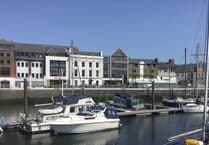The island is under no obligation to follow the UK’s planned points-based immigration system.
And Chief Minister Howard Quayle insisted that operating similar but differing rules will not see us used as a ’back door’ into Britain.
Under a planned new system unveiled by Home Secretary Priti Patel last week, immigrants will require 70 points to enter the UK following the end of the Brexit transition period.
Points can be earned, for example, by speaking English, having a PhD and securing a job that pays over £25,000.
In April 2017, the Council of Ministers agreed with the UK and the other Crown Dependencies to maintain an integrated approach to immigration policy.
This agreement means that whilst the UK’s primary immigration legislation is extended to the Isle of Man, the island is at liberty to tailor the rules to meet the needs and profile of our economy.
We are under no obligation to introduce the UK’s points-based system (PBS), said Mr Quayle.
He said: ’The island and the UK have similar but differing immigration rules and this will continue.’
Following Brexit, free movement of EU, EEA and Swiss nationals ends on December 31 this year, after which they will fall under immigration control.
When the UK introduces its new PBS rules on January 1 next year, EU migrants who wish to come to the UK to work will need to meet these rules the same as non-EU citizens.
EU migrants who wish to come to the island from that same date will be required to apply under the island’s immigration rules.
Mr Quayle said the island could not be used as a back door in the UK as the visa issued to the migrant to work in the island is not valid to work in the UK.
Should they wish to relocate to the UK, they would then need to meet the requirement of the UK immigration rules.
Similarly, a visa issued by the UK is not automatically valid to work in the island.
’If they want to use the Isle of Man as a stepping stone they would have to apply to the UK,’ Mr Quayle said.
The island has followed the UK’s points-based system for ’Tier 2’ workers since 2010.
This was replaced by a Worker Route from April 2018 which allows employers to recruit workers from outside of the European Economic Area in roles they cannot fill with local, UK and EU migrants.
Under the Worker Route a migrant would need to hold a certificate of employment which the employer will have obtained from the Immigration Service.
This certificate is used to support a visa application. The employer has a responsibility to keep Immigration notified if, for example, the migrant did not take up the job after the visa was issued.
The current Worker Route is designed to include job roles identified as needed to support the Manx economy.
Mr Quayle said the Department for Enterprise is working with industry to identify roles needed to be included in the rules in readiness for January 1 next year.
These, for example, will cover the hospitality and agricultural industries.
As Minister for the Cabinet Office, Mr Quayle will make any changes to the immigration rules, including these new ’Business Migrant’ routes, before the end of this year.
The Chief Minister stressed that there will be no change to the rights and status of EU citizens currently living in the island who apply to the EU Settlement Scheme.
’If you’re an EU, EEA or Swiss citizen living in the island, you and your family members can apply to the EU Settlement Scheme to continue living in the island beyond June 30 next year,’ Mr Quayle said.

-(1).jpeg?width=209&height=140&crop=209:145,smart&quality=75)

-and-Barbara-Guy-(right).jpeg?width=209&height=140&crop=209:145,smart&quality=75)

Comments
This article has no comments yet. Be the first to leave a comment.